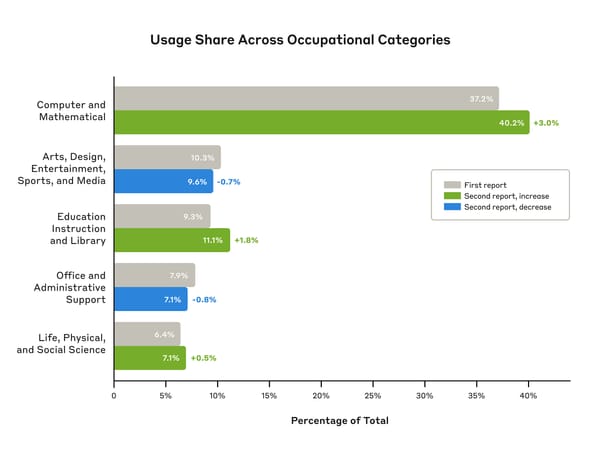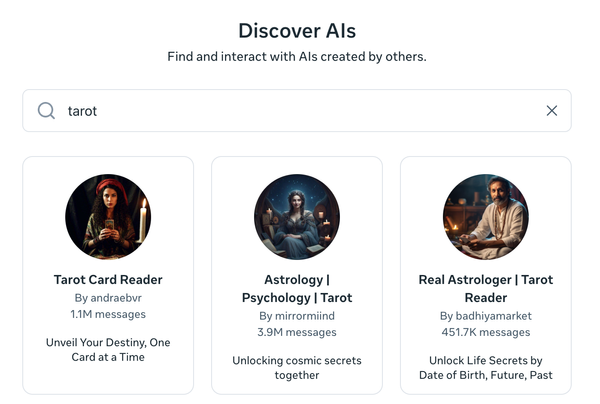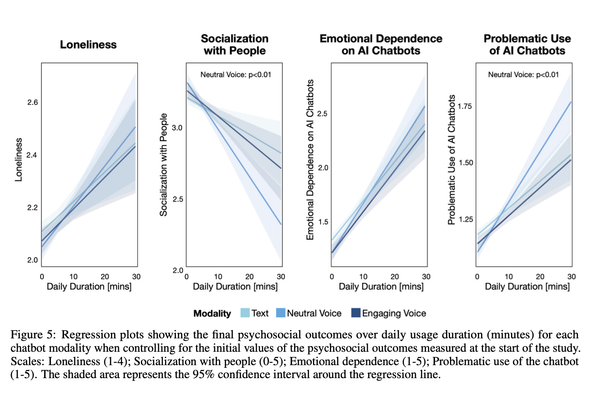What we’re learning from the Reddit blackout
Five lessons, and one open question

After a bruising week of protests and locked-down forums, things started to get back to normal Tuesday on Reddit, as — oh wait, what’s this?
A handful of subreddits have classified themselves as not safe for work (NSFW) to protest Reddit’s recent treatment of the platform’s volunteer moderators, and as a result, some non-porn communities are starting to get a lot of porn.
Subreddits that have made the NSFW switch include r/interestingasfuck, r/TIHI (Thanks I Hate It), r/formula1, r/videos, r/HomeKit, and r/HomePod.
As Jay Peters writes in that piece, designating forums as NSFW annoys Reddit Inc. in a variety of ways: it prevents ads from running on them, for example, and restricts them from being viewed by logged-out users, effectively keeping them semi-private.
It’s the latest sign that protests over changes to the Reddit API, while clearly on the wane, have not yet fully abated. More than a third of all subreddits that committed to going dark remain private, according to the tracker Reddark, and some moderators say they intend to keep up the disruption until Reddit walks back its announced changes.
While the situation remains too fluid to undertake a full postmortem, today let’s talk about what we’ve learned from Reddit’s standoff with its user base so far. Reddit was early to the idea that successful social products work to transfer power to their users — but the site’s woes this month suggest that relying too much on the user base to maintain the service may make them question what they ever needed the platform for, anyway.
- Devolving power to users can come back to haunt a platform …
Of all the content moderation regimes set up by social platforms over the past two decades, Reddit’s might well have been the best. The site sets a “floor” of rules that every forum must meet — no terrorism, no child exploitation — but lets any individual subreddit raise the “ceiling” with rules of its own. If a religious forum wants to ban cursing, it’s welcome to. If an NSFW forum wants to ban images of people with their clothes on, that’s fair game, too.
While Facebook and Twitter attempted to govern vast global audiences with a one-size-fits-all set of rules, Reddit’s approach brought context and community to its niche forums. Making it work, though, required an army of volunteer moderators to set up and enforce their subreddits’ particular rules. As we’ve seen over the past week, collectively those moderators wield real power: traffic dropped an estimated 6.6 percent last week as subreddits went dark, according to one estimate. And because they set the rules, it was up to the moderators whether or when the subreddits would ever come back online.
This power dynamic seemed to infuriate CEO Steve Huffman, who referred to moderators over the weekend as a “landed gentry” who lack accountability to their constituents. Huffman told NBC’s David Ingram that he is considering making changes to Reddit’s rules that would let users vote out moderators more easily over unpopular decisions — like taking a subreddit private, for example.
“If you’re a politician or a business owner, you are accountable to your constituents. So a politician needs to be elected, and a business owner can be fired by its shareholders,” Huffman told Ingram. “And I think, on Reddit, the analogy is closer to the landed gentry: The people who get there first get to stay there and pass it down to their descendants, and that is not democratic.”
Reddit could have, but so far has not, simply overridden moderators’ decisions and turned all the dark subreddits public again. Instead, the company wrote to moderators suggesting that it would remove them if they did not make their forums public again.
On the whole, Reddit has benefited from a system that largely spares its leaders from having to make impossible decisions over what kinds of speech belong on the platform. But it also makes the company unusually vulnerable when, in an effort to wrest back some power from the user base, they revolt.
- … But devolving power to the user base is still probably the future of social networks.
Redditors are mad that, due to a huge spike in the price of Reddit’s API, the third-party clients they currently rely on for browsing, moderation, and accessibility may now disappear. They had come to expect that Reddit’s decentralized approach to governing the site would always extend to the way that it managed development of the site itself. (In fairness to them, Reddit executives certainly talk about it that way.)
Reddit’s rationale is straightforward: to cut costs and make its ad business profitable, it needs to push users toward its native app and website, where users can be monetized more easily. The decentralized ethos has begun to give way toward a more conventional walled-garden approach.
In doing so, though, Reddit may be swimming against the tide. Increasingly, next-generation social networks are starting from the idea that they ought to be governed from the bottom up. Led by Mastodon, and followed more recently by Bluesky and Meta’s forthcoming Threads, newer networks are moving way from the walled-garden model toward something looser and less formal.
Of course, none of those apps are yet profitable. Nor have they even really hit a critical mass of users. But it’s clear that the era of free APIs has given way to the era of free development protocols. And to the extent that these services can enable vibrant, self-governed communities and development ecosystems of their own, they may make Reddit’s more halfhearted attempt at decentralization look outdated.
- Mainly this whole Reddit thing has been a communications disaster.
How much would the new API cost? When would it take effect? Which kinds of apps using the API would be affected?
These are among the questions Reddit had no answers for when it announced its forthcoming changes in April. That led to weeks of confusion as everyone affected tried to figure out what all this meant for them.
These days, platforms rarely make major changes without accompanying the announcement with answers to all the most obvious questions. Reddit didn’t, and paid the price. I’m not sure if the company thought that positioning its move as a defense against large language models would inoculate it from criticism, but if so it clearly thought wrong.
Meanwhile, Huffman’s interviews over the weekend, while admirable for their candor, also heightened the perception that the company is at war with its own user base.
Usually when platforms upset their users, good communications can only help at the margins. In this case, though, truly terrible communications took what could have been an orderly transition and turned it into a crisis.
- CEOs really are taking cues from Elon Musk.
If you’re wondering how all this shakes out for Reddit as business, it’s worth noting that Huffman says he is impressed with Twitter 2.0:
“As a company smaller than theirs, sub-$1 billion in revenue, I used to look at Twitter and say, ‘Well, why can’t they break even at 4 or 5 billion in revenue? What about their business do we not understand?’ Because I think we should be able to do that quite handsomely,” he said.
“And then I think one of the nonobvious things that Elon showed is what I was hoping would be true, which is: You can run a company with that many users in the ads business and break even with a lot fewer people,” Huffman said.
We wrote in November that lots of tech CEOs were impressed with Musk’s brutal cost-cutting, and now here’s one of them saying that on the record. (Mark Zuckerberg said something similar to Lex Fridman this month, though in fairness Fridman has asked him to say something nice about the Twitter CEO.)
Anyway, I mention all this because Twitter is absolutely not “breaking even.” As William Cohan wrote in Puck over the weekend, Musk has already vaporized tens of billions of dollars in value, and is likely cruising toward a takeover by his creditors. If your CEO observes this and holds it up as a model for your company, I’d worry.
- Redditors do have other options.
In the past few days, decentralized alternatives to Reddit picked up around 70,000 users over more than 1,000 instances, according to this blog post on the subject. That’s quite small compared to Reddit, of course. But it does at least raise the question of what Reddit users actually need Reddit for.
The value of the site lies almost entirely in the people posting there. This is not a company that makes fun creative tools, hypnotic ranking algorithms, or pixel-polished designs. Instead, it aggregates a lot of eyeballs and lets the owners of those eyeballs run their own forums.
This, then, becomes another way the company is beholden to its users. Because the company offers the average user little more than basic infrastructure, it creates an opportunity for users to seek alternative infrastructure elsewhere. Networks can and do move over time. (Which is the actual lesson Huffman should be taking from Musk’s Twitter.)
That leads me to the one question I have about all this. It’s clear that events of the past couple months have hurt Reddit’s trust with its user base. But how much will that matter in the end?
Huffman’s argument is that this whole protest is a tempest in a teapot — the actions of a few unruly moderators who do not represent the user base at large. If that’s the case, perhaps he can be confident that the whole thing will blow over soon. It does seem telling that, so far at least, Reddit employees seem to be taking Huffman’s side. (As Alex Heath reported on Friday.)
On the other hand — thousands of subreddits remain private! Alternative sites are now in active development. And the fracture that opened up in social networks when Musk bought Twitter is continuing to spread. Ever-shifting platform rules are leading more people to look for places they can govern themselves.
And few people will be better at that than the ones who have spent the past 18 years moderating Reddit.
Correction, June 21: This post originally said that more than a third of subreddits remained dark. In fact, more than a third of subreddits that had committed to going private remain dark.
Lovett or Leave It
Bay Area! If you’re looking for something fun to do Friday, I’ll be a guest at the live tour for the incredible Lovett or Leave It podcast. The show is at 8PM at the Palace of Fine Arts in San Francisco. Get tickets here. Come say hi!


As you may recall, I’m co-hosting the Code Conference this year with Nilay Patel and Julia Boorstin. Today we announced our first speaker: Twitter CEO Linda Yaccarino, who will sit down with Julia for what promises to be a news-making conversation.
Yaccarino is the first of several big speakers we have planned. Join us for the event? I’d love to stock the room with Platformer readers. You can get tickets here.
Governing
- The EU last week passed a draft version of its landmark AI Act, which is expected to be passed into law later this year and will limit use of facial recognition and require new privacy and data disclosures from AI firms. (Adam Satariano / The New York Times)
- A new bipartisan bill from Sen. Josh Hawley and Sen. Richard Blumenthal would explicitly strip AI companies of Section 230 immunity from civil claims and criminal penalties. The bill is aptly called the "No Section 230 Immunity for AI Act.” (Ashley Gold and Andrew Solender / Axios)
- Google was forced to postpone the launch of its Bard chatbot in the EU last week over concerns that it does not comply with GDPR. (Clothilde Goujard / Politico)
- AI tools have sparked a “predatory arms race” among peddlers of child pornography, resulting in thousands of AI-generated images on the dark web that are complicating efforts to catch pedophiles. (Drew Harwell / The Washington Post)
- A lack of federal guidelines around the use of AI in political advertising risks letting misinformation run rampant during the 2024 election. (Ashley Gold / Axios)
- U.K. regulators cleared Amazon’s acquisition of Roomba maker iRobot, but the deal is still facing regulatory review with the FTC and European Commission. (Katharine Gemmell / Bloomberg)
- Adobe’s $20 billion acquisition of design platform Figma will likely face a lengthy investigation in the EU on top of probes in the U.S. and the U.K. (Javier Espinoza / Financial Times)
- Lina Khan rejected the recommendation of the FTC’s ethics official that she recuse herself in a lawsuit against Meta over its acquisition of VR fitness firm Within. Khan initially landed in hot water over public comments on Meta’s acquisition strategy. (Leah Nylen / Bloomberg)
- Republican lawmakers are attempting to squash disinformation research by waging a legal campaign against academics that characterizes it as an effort to stifle conservative speech. This is awful! (Steven Lee Myers and Sheera Frenkel / The New York Times)
- Meta has made repeated concessions to Vietnam’s authoritarian government by censoring dissent on Facebook and forcing critics of the regime off the platform. Censorship in Vietnam appears to be getting worse. (Rebecca Tan / The Washington Post)
- The Taliban relies on WhatsApp to coordinate wide swaths of the Afghan government, which puts it in constant conflict with Meta due to U.S. sanctions that require banning Taliban accounts. (Christina Goldbaum and Safiullah Padshah / The New York Times)
- A U.K. investigation into fraud on Facebook, Instagram and WhatsApp revealed how victims of crypto scams and other crimes have lost hundreds of millions of pounds with little to no recourse. (Jess Clark and Zoe Wood / The Guardian)
- Meta, in following the recommendation of its Oversight Board, rolled back its global COVID-19 misinformation policy in favor of a more localized approach. (Cristiano Lima and David DiMolfetta / The Washington Post)
- Meta said it would lower the age requirement of its Quest headset from 13 to 10, a move that could open the company up to significant new data privacy and child safety scrutiny. (Mike Isaac, Adam Satariano and Natasha Singer / The New York Times)
- Hanan Elatr, the wife of murdered journalist Jamal Khashoggi, sued Pegasus spyware maker NSO Group over claims that the product contributed to Khashoggi’s assassination and put her life at risk, too. (Dana Priest / The Washington Post)
- The National Music Publishers’ Association filed a lawsuit against Twitter last week seeking $250 million in damages over alleged copyright infringement on the platform. (Lucas Shaw / Bloomberg)
- USA Today publisher Gannett sued Google for its alleged illegal monopoly on the digital advertising market, which the lawsuit argues resulted in decreased ad revenue for media organizations. (Lauren Feiner / CNBC)
- Twitter suspended the account of prominent Elon Musk and Tesla critic Aaron Greenspan, as well as the account of Greenspan’s lawsuit tracker PlainSite, without explanation. Greenspan and Musk happen to be suing one another over Greenspan’s disclosures. (Lora Kolodny / CNBC)
- Twitter suspended AI-powered Twitter bot “Explain This Bob” after Musk called it a “scam crypto account,” despite him having positive interactions with the bot in the past. The bot is linked to a meme coin called BOB Token. (Tim Hakki / Decrypt)
- Prominent rightwing Twitter personalities like Joe Rogan teamed up with Musk to instigate a harassment campaign against vaccine scientist Dr. Peter Hotez over the weekend. The campaign’s ostensible goal was to have Hotez debate anti-vaxxer and presidential candidate Robert F. Kennedy Jr. on Rogan’s podcast. (Anna Merlan / Motherboard)
- Research on the harmful mental health effects of social media on teenagers is inconclusive, making efforts to draft policy on the subject more difficult. (Claire Cain Miller / The New York Times)
- A report on the state of journalism found that participation and trust in the media is declining rapidly, while many younger consumers now turn to online influencers on Instagram, TikTok and YouTube for news. (Nic Newman / Reuters Institute)
Industry
- An in-depth report on Mark Zuckerberg’s prescient bet on AI roughly a decade ago underscores how Meta now finds itself playing catch-up with rivals. (Karen Hao, Salvador Rodriguez and Deepa Seetharaman / WSJ)
- Meta plans to make the next version of its open source large-language model available for other companies to use freely, in a challenge to the business models of Google and other AI competitors. (Sylvia Varnham O'Regan, Jon Victor and Amir Efrati / The Information)
- Meta unveiled a new text-to-speech AI model called Voicebox for generating convincingly human audio clips, but it has opted not to open source the software for now. (Andrew Tarantola / Engadget)
- Facebook traffic to news publishers saw a steep decline last month after an apparent algorithm change further de-prioritized posts from media pages. (Thomas Germain / Gizmodo)
- WhatsApp announced a new feature to automatically silence calls from unknown numbers in an effort to reduce spam in major markets like India. (Ivan Mehta / TechCrunch)
- Snap said about 20% of its user base, or 150 million people, have sent more than 10 billion messages to its My AI chatbot, and it now intends to use the data to better personalize ads. (Alex Barinka / Bloomberg)
- Celebrities are increasingly using generative AI tools to exert control over the use of their image and likeness in ads and marketing campaigns. It’s possible we will never know what any celebrity’s face actually looks like ever again. (Patrick Coffee / WSJ)
- Underage Roblox players are using phishing attacks against NFT owners on Discord and Twitter to steal money for in-game skins. The phishing software, called an NFT drainer, is alarmingly easy to procure and deploy. (Tim Copeland / The Block)
- Roblox said it would allow creators to build mature experiences for users aged 17 and up as part of a goal to continue attracting older players and expanding its fast-growing 17-24 demographic. (Ashley Capoot / CNBC)
- Twitter CEO Linda Yaccarino is telling investors that the platform plans to focus on courting creators, promoting video, and growing its commerce business. (Sheila Dang / Reuters)
- Neither Musk nor Yaccarino will be attending the Cannes Lions ad festival, despite Twitter’s promise to explore “brand safety controls” to try and win back lost advertisers. (Mark Bergen / Bloomberg)
- Yaccarino will, however, be attending Vox Media’s Code Conference in September, where she will be interviewed by CNBC reporter and conference co-host Julia Boorstin. (Nilay Patel / The Verge)
- New social network Spill, created by ex-Twitter employees, launched on the App Store in an invite-only beta. (Amanda Silberling / TechCrunch)
- John Gruber lambasted Mastodon users and other federated social media proponents who signed a pact pledging to block Threads and other ActivityPub instances operated by Meta. (John Gruber / Daring Fireball)
- A profile of Twitch CEO Dan Clancy, who took over in March, explores the former NASA engineer’s unconventional background — and whether his vision can balance profitability with keeping creators happy. (Annie Goldsmith / The Information)
Those good tweets
For more good tweets every day, follow Casey’s Instagram stories.
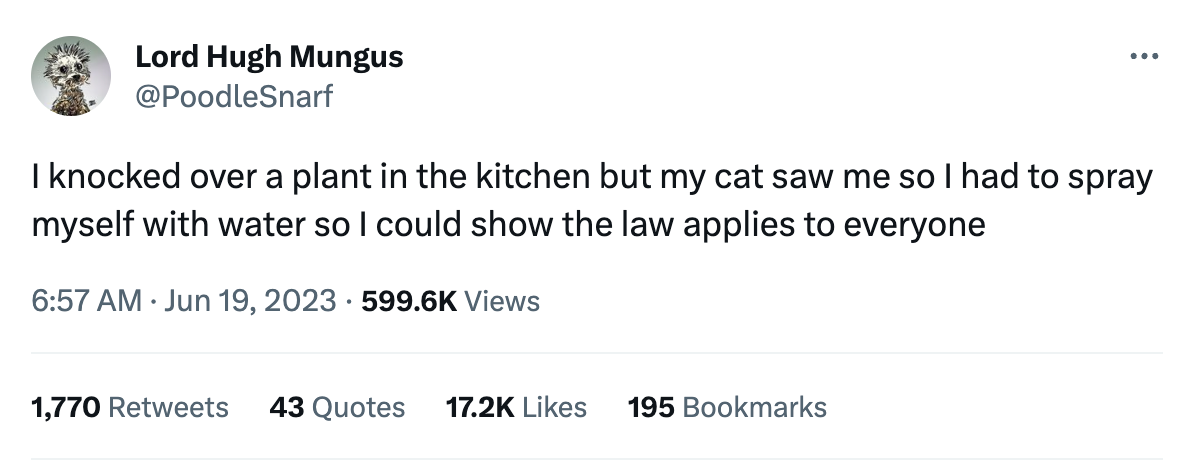
(Link)
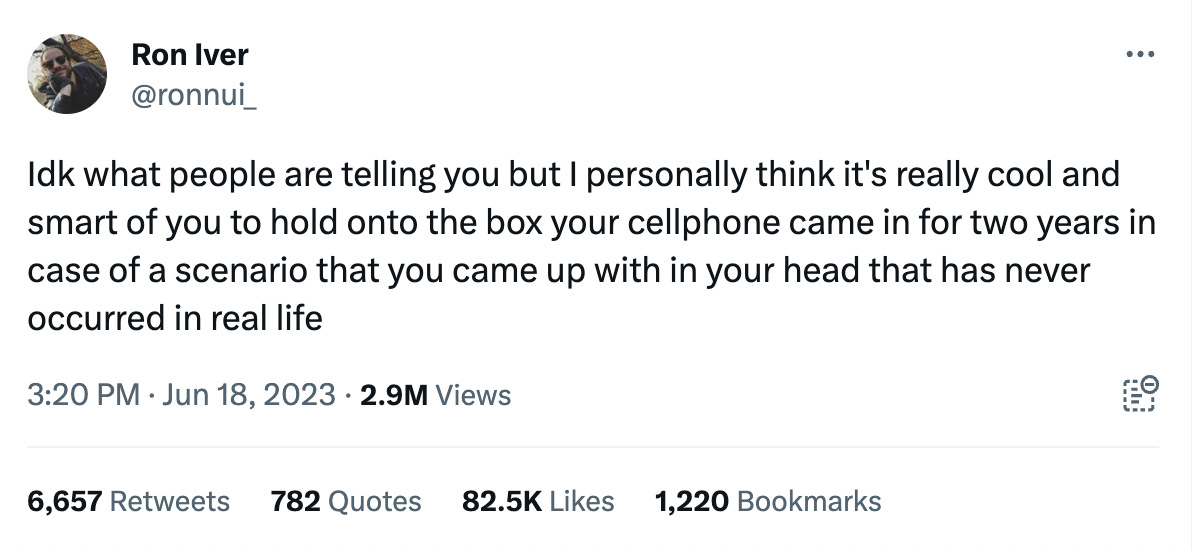
(Link)

(Link)
Talk to us
Send us tips, comments, questions, and still-dark subreddits: casey@platformer.news and zoe@platformer.news.


